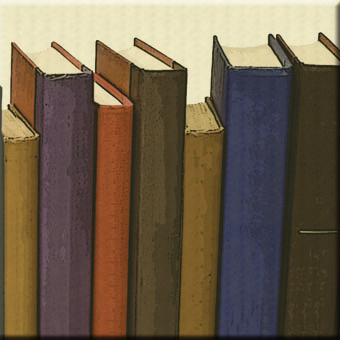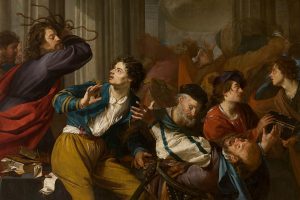The St. Francis de Sales Parish Book Club meets in the basement room in the rectory where Father Matthias used to run the parish weight-lifting club, until he was recruited by the local Lutheran university football team to be their strength and conditioning coach, which he says cheerfully is a ministry among the heathen not unlike St. Thomas sweating amid the Hindus on the teeming shores of India, although the Lutherans, God bless their tall and well-groomed souls, are a sect founded by a Catholic monk, so we must remember they are our cousins in the Merciful Lord Jesus, and besides, old Martin Luther did say sin boldly, for which you have to admire the old reprobate.
Anyway, says Mrs. Cooney, notwithstanding Father Matt’s convoluted apologetics here, we are not here to talk about Father Matt, who remains a priest in good standing even if he is bulking up the Lutherans, despite what certain unnamed members of the Altar Society twitter in scurrilous fashion, but we are here to decide what books to read this fall, before we return to the collected works of the greatest Catholic novelist of all time, who is of course Maeve Binchy. The floor is open.
The plays of His Holiness the late John Paul II!
Great pope, awful playwright, says Mrs. Cooney. No. Next.
The essays of Andre Dubus?
Yes. Best Catholic writer since Flannery O’Connor.
Should we read his stories also?
No. Adultery every third page. He’s the American Graham Greene.
James Joyce?
Well—he wasn’t Catholic after puberty. Maybe Dubliners.
Merton’s The Seven Storey Mountain!
No. Overwritten boyish burble. A good editor would have halved it.
Objection! It totally caught the Catholic zeitgeist of the 1950s!
Anyone using the word zeitgeist loses her vote, says Mrs. Cooney coldly. Next.
Ron Hansen’s novel Mariette in Ecstasy?
Is that . . . lurid? If so I vote yes.
No, no—life in a convent, awe, jealousy, stigmata. Genius stuff.
Approved, says Mrs. Cooney. Which reminds me that we should also have Rumer Godden’s This House of Brede on the list. Masterpiece. Set in an abbey.
Dorothy Day’s diaries?
Yes. What a witness to the miracle of every moment.
Peter Maurin?
Yes. Pithiest writer ever.
Flannery O’Connor’s letters?
Yes. Maybe the only writer other than Robert Louis Stevenson whose letters are not about money. Writers—what a bunch of whiners.
Chesterton?
No. Poor man never had an unpublished thought. Let’s not reward him for that.
Waugh?
No, he’s English. No imperial slavemasters this year.
Annie Dillard?
Yes. Maybe Pilgrim at Tinker Creek, right after Dorothy Day, as a sort of witness to wonder theme. Then maybe For the Time Being, which is weird and glorious.
Teilhard de Chardin?
No. Incomprehensible muck. Not even Teilhard knew what he was talking about, the poor man. Plus he was a Jesuit, and we are focusing on Catholic writers this year.
George Bernanos?
No. No one admits how dull Diary of Country Priest is.
Carlo Levi?
No. Humorless.
Primo Levi?
Yes. Another one for our witness to grace theme. Can you witness evil and report on it in such a way that no one can ever forget what happened ever again, which is a blow against the darkness? Yes.
Joseph Bernardin?
Yes. That man was a saint.
J. F. Powers?
Yes. Let’s read all of Powers. Half-forgotten, and undeservedly so. As fine a Catholic fiction writer as this country ever hatched from its salty soil, period.
Fulton Sheen?
No. You know the rules: No writers who wore heavy makeup.
Paul Wilkes’ In Mysterious Ways: The Death and Life of a Parish Priest?
Yes.
Mary Gordon?
Yes.
Walker Percy?
Yes.
Myles Connolly’s Mr. Blue?
No. No campus novels. Even Nabokov couldn’t do it well.
Willa Cather’s Death Comes for the Archbishop?
Yes. Genius.
LeBron James?
Not Catholic—yet. Mrs. Warren, how many books are on the list now?
Seven thousand.
No, really.
Thirty.
That should take us through the first month. Let’s keep going.
Alice McDermott!
Ooooooooo, great choice. The great Catholic novelist of our time. We’ll start with Charming Billy and then go to At Weddings and Wakes and finish with After This. Triptych.
Gesundheit.
The King James Bible?
Isn’t that missing a couple of key chapters?
Yes, but my heavens, the prickly thorny muscular edgy prose—makes all the other translations sound like Lutherans singing into bowls of oatmeal.
Well—maybe the second half, the good part, says Mrs. Cooney. So there’s the winter taken care of. Spring books?
Do they have to be by Catholic writers?
No—we already have Primo Levi, and he was Italian. But let’s stay with witnesses to grace.
Wendell Berry’s essays?
Yes.
David James Duncan’s God Laughs & Plays!
Terrific choice. Although didn’t he grow up Seventh-Day Adventist?
Yes, but he recovered.
You know why the Seventh-Day Adventists frown on premarital sex?
Why?
Might lead to dancing.
All right, all right. Other suggestions?
The Shawl by Cynthia Ozick.
Great choice. But we can read that haunting story in 10 minutes. Although maybe we should focus on shorter works in the spring. Sap rising and all that. Young men’s fancies turning to love and play-off hockey.
Mark Twain’s essay “The War Prayer.”
Yes.
Merton’s poem “Original Child Bomb.”
Yes.
LeBron James!
No.
Chet Raymo.
Good choice. I nominate Climbing Brandon. A thin masterpiece, like David Bowie.
Mary Oliver?
Is she Catholic?
No, but she’s the great American poet of our time, and attentiveness is the beginning of all prayer, as she says, and Catholicism really is about attentiveness as the crucial step in witnessing and celebrating the extraordinary generosity of God to us, his mewling and muddled children, therefore Mary Oliver, one might conclude, is the great Catholic poet of our time, other than Bruce Springsteen.
Is that kind of weird reasoning legal?
Isn’t it hermeneutical?
Herman who?
Isn’t Springsteen Jewish?
Can Father Matt make a Lutheran so big that not even Father Matt can lift him?
If a Muslim man becomes a mathematician and a musician, is he Islamamathemusical?
I think we have come to the end of the useful part of this meeting, says Mrs. Cooney, with the faintest hint of a smile. Mrs. Warren, what’s our total?
Fifty thousand.
No, really.
Forty.
Motion to adjourn? We just have time to open our Witness to Grace season upstairs in the den—LeBron James is on, and Father Matt says he’ll give a short talk about the Los Angeles Lakers as the evil spawn of the Dark One. First assignment, then, to be read by next next Thursday: Andre Dubus’ Meditations from a Moveable Chair.
Wasn’t he a Red Sox fan? Isn’t that Calvinist?
Enough, says Mrs. Cooney firmly. Game time. Do we have enough beer glasses?
Is that a rhetorical question?
Herman who?














Add comment